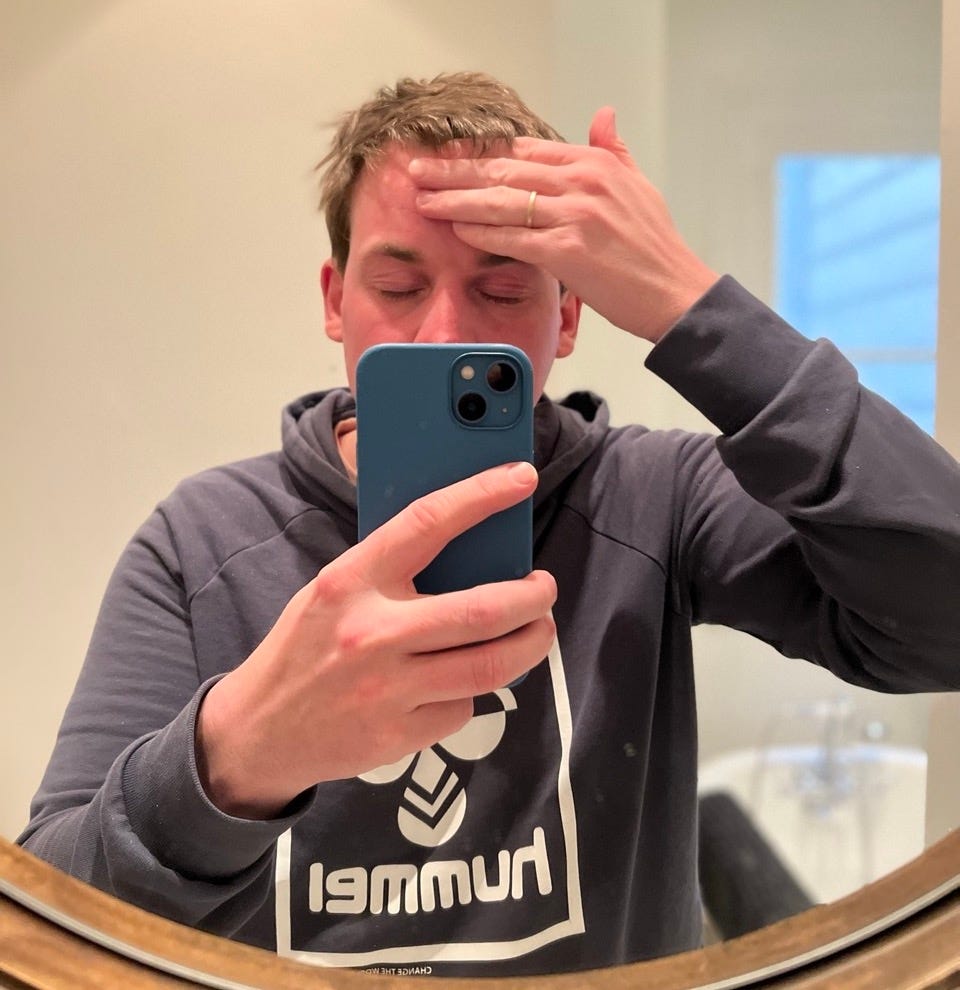I’m 36, and I have made a morning routine for the first time in twenty years.
The last time I felt in control of my morning was after I got a guitar for my 15th birthday and woke up early to practice it before school. I did that for me because it made me feel good. This routine didn’t last long, though. And since, my mornings have mostly been about getting up and brute-forcing my body into the day.
Routines break down when you undergo depression. People who have experienced it will tell you that simple things like showering or brushing your teeth become a considerable effort. But you might still force yourself to do it because people expect you to, and you want to avoid the shame that comes with appearing disheveled. Or maybe you stop caring even about that. And the way to avoid that shame is to stop looking at yourself at all.
I have been there—many times. And I made excuses. Like that I was resisting society’s pressure to look specific ways and that people occupied with appearance are shallow. At the same time, I felt tremendous shame and anxiety because I didn’t manage to look put together or stylish as others. I was still preoccupied with projecting my insecurity through what I thought others looked at me.
I could hide behind these ideas because I grew up in a weird mix of toxic masculinity and leftist anti-consumerism. On the one side, desirability framed mens’ motivation to tend to their bodies (read: getting that six-pack for the ladies1). On the other, you weren’t supposed to succumb to the capitalist pressures to wear certain brands and look in the ways big fashion wanted you to.
The LYNX Effect
As a teenager, I didn’t have access to stories where men did any self-care beyond spraying LYNX2 body spray all over themselves to attract hordes of models. Oh, men could also shave, but that was beyond my bodily capacities. I believe I was well into my 20s before it was meaningful for me to shave. And I don’t have the growth to get into elaborate shaping.
I read Naomi Klein’s NO LOGO when I was 16 and didn’t catch the irony. Protesting brands and “not caring” how you dressed was a performance. We were dressing the act to fit into our leftist circles. Still in negotiation with how others perceived and accepted you. I wore a kilt-like skirt at high school, grew my hair out, adopted a “dread-like” look, played in a rock band, and listened to Nirvana. Whatever shit I got from my rural classmates (well, “mates”) affirmed my belonging to the group of select few who “got it.” It wasn’t about how I felt like me. But it was also probably normal teenager behavior.

I took these sentiments with me into adulthood. And depression stole my agency for how I wanted to go through my days. I wasn’t aware that self-care could involve freshening up and dressing in a way that makes you feel good. That makes you feel confident because you take charge and allow yourself to do what you desire and not what you believe people expect.
Last fall, I was recommended the sixth season of Queer Eye, which fundamentally changed my perspective. I hadn’t watched the show before because I assumed it was another over-produced show about fitting into beauty standards. Well, there’s a present element of consumerism, but the philosophy is of self-affirmation. It’s about self-care in the sense of actually taking the time and effort to take care of yourself. And figuring out what makes you feel good and accomodating your home, wardrobe, and lifestyle after that. And to look past the stories, you have been told of how you can do that. It turned out to be a harrowing binge for me. (Yes, I teared up a lot.)
My New Morning Routine
I’m still figuring out my morning routine, and of course, I’m not entirely consistent. That’s not the point either. It is the motivation and meaning I get out of doing it. I’ve taken control over how I start my days and I’m doing it for me. It has become a project and not guilt.
My morning routine starts with getting enough sleep—something I can have now that I’m not undergoing depressive symptoms. I’ve gone from less than six hours to well over seven on average and over eight on the weekends. I can finally effortlessly get out of bed and feel somewhat rested. I’m trying to quit going through my phone after I’ve turned off the alarm with little success so far.
Morning Pages
After getting out of bed, the first thing I do is write “morning pages.” Morning pages is a creative technique popularized by author Julia Cameron but introduced to me by my partner, who got it from a podcast interview3 with the prolific Norwegian author Ida Jackson.
It’s a basic concept: Write down your stream of consciousness and fill three pages in a notebook (of any size). Whatever you think of, worries you, excites you, write it down. You’re not using this text for anything; you’re probably not even going to read it. But you’ll notice what’s on your mind, and you’re allowing yourself to externalize your thoughts and anxieties. I have found it transformative and a great help since I haven’t traditionally been great at putting to words what’s bothering or motivating me.
A Clean Start
The next thing I’ll do is shave (every other day) and shower (if I didn’t do it right before bed). What’s new is what comes next: I’ve started a face routine. I guess I can thank Jonathan Van Ness for this because they demonstrated that self-grooming is not only something that men can do, but it can feel great.
I went online and ordered a Viking Revolution Facial Scrub, Kiehl’s Facial Fuel Energizing Face Wash, and Kiehl’s Facial Fuel Energizing Moisture Treatment for Men. Yes, it’s silly that these products are marketed “for men,” and yes, not the cheapest stuff. But that adds to the experience. It matters that I spent a bit of money on myself, and more importantly, it feels ✨great✨ to go through the ritual of applying these things to my tired face. Whatever is in this stuff, it makes my face feel fresh and clean and “open.”
What matters is that you spend that time in front of the mirror taking care of yourself in a way that makes you feel better. If the morning pages make you aware of how your brain is doing, then standing in front of the mirror and getting your skin cleaner and smoother does the same thing, but for your body.
I suspect that having beards and treating them with all sorts of ointments became a thing some years ago as a way for men to have self-care without compromising their masculinity. I hope, with this post, that I contribute with a story that lets you (or someone you know) break out of the narrow confines that the boomers’ narrow sense of masculinity made for us.
Dressing My Part
My new morning routine is still a work in progress, but I have also started to pay more attention to how I dress. First of all, it’s finding the clothes that fit me and make me feel comfortable yet stylish. Nowadays, I go for a very safe and comfortable hoodie and jeans thing. Very comfortable, but far from fashionable. I want to pay more attention to style and composition. Because I care about those things, I appreciate it when others do the same. I have never allowed myself to care about that stuff. And again, I feel shameful when I’m proximate with people who do.
There is, of course, a social dynamic to how you dress and appear. You can show care and appreciation for others by showing up clean, fresh, and well-dressed. It signals that you made an effort for them. The subtlety, however, is that what I suspect people appreciate is that it makes you feel good about yourself and allows you to be present and accessible without asking for their permission or validation to feel great.
Reclaiming Agency Through Self-Care
I’m making a big deal out of seemingly trivial things. But I hope this demonstrates both how depression really can steal your sense of self and your agency and how the stories we tell to boys4 and men (of all kinds) shape the ways we can express and do self-love. There are also stories about how to be a grown-up that becomes a source of shame and anxiety when you’re in a state where you don’t manage to take proper care of yourself. I’m grateful to shows like Queer Eye that tells the story of all sorts of people who have lost themselves in their work, past, and commitments to others; who don’t manage to do the grown-up things but get shown a path to confidence from a group of well-dressed, handsome, and empathetic men.
What do you do to feel good every day? And, is there a thing that you haven’t allowed yourself to do? It might be worth closer inspection.
Turns out: “The ladies” probably don’t care about your six-pack, but they do care about how you take care of yourself.
In Norway, they branded LYNX as AXE. 🤷
The interview is in Norwegian but highly recommended if you know the language.
Of course, such stories are also told to girls and women, but they are not mine to tell and confront.




